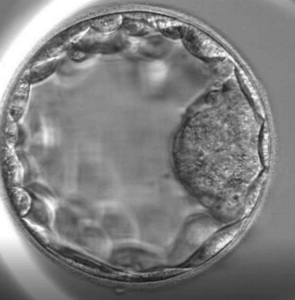Our Laboratory
Our Skills, Experience and Resources Set Us Apart
An IVF laboratory’s success relies on its staff’s experience and expertise. Our skilled team utilise our clinic’s resources to their fullest. They use the latest techniques and equipment to create optimal conditions for embryo development. We implement programmes that result in the best patient success rates, achieving rates comparable to the top clinics in the UK and USA.
Our Blastocyst Programmes
 Blastocyst Culture
Blastocyst Culture
Waterstone Clinic was the first clinic in Ireland to introduce a successful Blastocyst Programme. Blastocyst culturing is a laboratory technique where embryos are cultured for 5-6 days before transfer rather than the traditional three days. Blastocyst culturing allows the cells in the embryo to divide many more times and allows the trained eye of the embryologist to choose the best embryo for transfer, maximising the chance of pregnancy.
Elective Single Embryo Transfer (e-SET) Programme
The success of blastocyst culture procedures at Waterstone Clinic led to the introduction of a highly successful elective Single Embryo Transfer (e-SET) Programme. eSET is a programme where only one embryo (selected from a larger number of available embryos) is transferred to the uterus, and the remaining embryos are cryopreserved for future use. Transferring one embryo reduces the chance of multiple pregnancy without reducing the chance of success. The programme is an effective and safe way to build families, one healthy baby at a time, leading to better outcomes for mothers and babies.
Our live birth rate for first-time IVF/ICSI treatment is 62% (patients aged 40 and under).
Our Cyropreservation Programmes

Cryopreservation has revolutionised fertility treatment over the last ten years. Our cryopreservation programme allows us to preserve additional embryos, eggs and sperm that are not required immediately for a fresh treatment cycle. This allows patients to return for treatment at a later point without having to start a cycle from the beginning.
Vitrification
At Waterstone Clinic, we use a particular freezing technique called vitrification to freeze embryos and eggs. The vitrification process freezes embryos much faster than conventional freezing methods. The vitrification freezing process is so fast it does not allow time for ice crystals to form within the cells, the process “vitrifies” the cells, turning them into a glass-like state.
Vitrification has vastly improved the rate of successful thawing of embryos. When using conventional slow-rate freezing, between 20-30% of embryos would not survive the thawing process, and those that did had half the success rate of fresh embryos to create a successful pregnancy. Now with vitrification, our laboratory has a 95% survival rate and the pregnancy rate is the same as with fresh embryos.
Open System Freezing
When egg freezing, we use open system procedures as per the international gold standard. Waterstone Clinic was the first clinic in Ireland to be granted a licence to use open-system vitrification procedures for freezing eggs. We believe it is the most successful method available and delivers the best results for patients.
Our Laboratory Resources
Many factors must come together to achieve success in fertility treatment. Not all fertility laboratories are equal in terms of the quality of the environment they provide. We are proud to say that our laboratories are Ireland’s most advanced.
 Strict Laboratory Conditions
Strict Laboratory Conditions
We employ strict quality control measures, monitoring our equipment, consumables and processes daily. The laboratory air quality is monitored to ensure we maintain the right culture conditions for the embryos, which are sensitive to temperature/light/ph fluctuations. We have invested in k-systems bench-top incubators, which allow for culturing embryos in individual compartments for maximum security and environmental control.
Laboratory details for each treatment cycle are recorded in a comprehensive database; this allows for a quick and thorough analysis of specific lab performance indicators and ensures we assess our successes and failures quickly and reliably. We know the investment couples make in their endeavours to have a child and do our utmost to help them achieve this goal.
Dedicated Pre-implantation Genetic Testing Laboratory Space
Our state-of-the-art laboratory space in our Cork Clinic has a dedicated Pre-implantation Genetic Testing laboratory, ensuring the embryologist has a dedicated space to carry out embryo biopsy.
Embryoscope+
We invest in our laboratory and use the most advanced technology and equipment, including the Embryoscope+ time-lapse incubator. These technologies can aid in selecting the best quality embryo for transfer, particularly when embryo selection is more challenging.
While the Embryoscope+ is an excellent incubator that offers stable conditions and images of the embryos that the embryologists can review without removing the embryos from incubation, the Embryoscope+ itself does not improve success rates. Instead, the Embryoscope+ is an additional tool in the armoury to assist our highly trained embryologists, who consistently deliver superior success rates at our clinic.
Our Research Programmes
The area of assisted reproduction is changing at an incredible pace, with new techniques and technologies emerging regularly. At Waterstone Clinic, research is central to improving assisted conception techniques and the chances of a healthy pregnancy.
Current research projects underway at Waterstone Clinic
Current projects include an essential observational study on the reproducibility and prognostic power of sperm DNA Fragmentation analysis.
Another project explores the possibility of predicting the premature delivery of twin pregnancies to individualise embryo transfer to either 1 or 2 embryos.
During your consultation or treatment cycle, you may be invited to be involved in a research study. When participating in a research study, you can be assured that there is no risk to you or your treatment cycle. You may be contributing vital information that may enhance the future of reproductive medicine.
